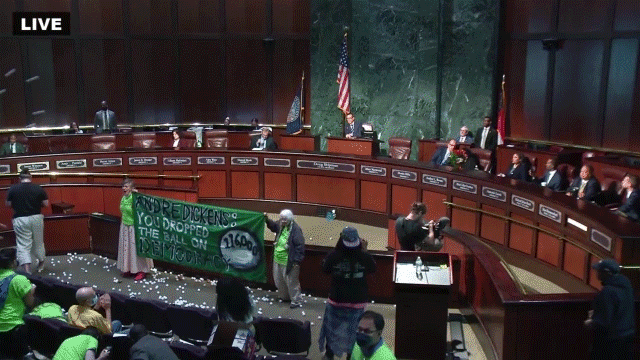Opposition to the Atlanta Public Safety Training Center, known as “Cop City,” was evident at a recent city council meeting, where residents who oppose the facility threw ping pong balls and chanted in protest. This protest marked a year since organizers submitted a petition with over 100,000 signatures to put a referendum on the ballot allowing residents to vote on the training facility. A federal lawsuit on the matter is pending, adding to the contentious nature of the situation.
During the meeting, protesters directed their frustration towards Atlanta Mayor Andre Dickens, accusing him of failing to uphold democracy. The protesters symbolically displayed a banner with the number 116,000, representing the signatures collected for the referendum, as they threw ping pong balls towards the city council members. While the protest was peaceful and lasted for about six minutes, it highlighted the ongoing opposition to the $90 million facility, which is intended to replace inadequate training facilities and address challenges in recruiting and retaining police officers in Atlanta.
Supporters of the training center argue that it is necessary to modernize the outdated facilities and improve training for law enforcement officers. However, opponents express concerns about police militarization and the facility’s location in a majority-Black area of the city. These concerns have fueled protests and demonstrations against “Cop City,” some of which have turned violent and resulted in vandalism. A recent incident involving the shooting of Manuel Esteban Paez Teran, also known as “Tortuguita,” by state troopers in January 2023 further heightened tensions surrounding the training center.
The decision by a special prosecutor in October 2023 not to pursue charges against the state troopers involved in the shooting of Teran has only added to the controversy surrounding the training center. City officials claim that the ongoing protests and related issues have increased the cost of the facility by nearly $20 million, further escalating the tensions between supporters and opponents of “Cop City.” The clashes between protesters and law enforcement have led to a volatile situation, with both sides remaining steadfast in their positions on the construction of the controversial facility.
Despite the opposition and legal challenges facing the Atlanta Public Safety Training Center, city officials and supporters of the project remain committed to moving forward with its construction. The facility is seen as a vital component in addressing the training needs of law enforcement in Atlanta and improving public safety in the city. However, concerns about police militarization, racial disparities, and community engagement continue to fuel the resistance to “Cop City,” creating a complex and divisive issue for Atlanta residents and officials alike.
As the debate over the Atlanta Public Safety Training Center continues, the protests and demonstrations against “Cop City” show no signs of subsiding. While both sides remain entrenched in their positions, the future of the controversial facility remains uncertain, with legal challenges, public opposition, and community tensions complicating its construction. The ongoing protests serve as a visible reminder of the deep-rooted divisions and concerns surrounding law enforcement, racial justice, and community engagement in Atlanta, highlighting the complex and challenging nature of addressing these issues in a city with a history of social and political activism.














